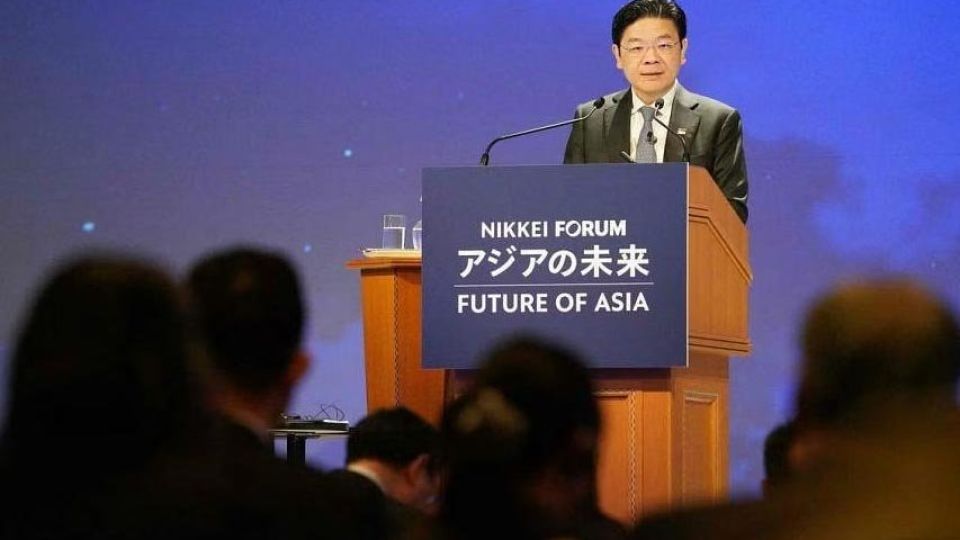May 26, 2023
TOKYO – The calls to “de-risk” – rather than “decouple” – from China could just as well lead to a more fragmented and decoupled world economy, warned Singapore’s Deputy Prime Minister Lawrence Wong on Thursday.
“It is hard to see how de-risking, at its current ambition and scale, can be strictly confined to just a few strategic areas without affecting broader economic interactions,” he said.
“If de-risking is taken too far, it would prompt reactions and unintended consequences. Over time, we will end up with a more fragmented and decoupled global economy.”
Addressing business leaders, academics and the media at the annual Nikkei forum Future of Asia, Mr Wong took on the latest language that had emerged at the recently concluded Group of Seven (G-7) summit of advanced economies in Hiroshima last week.
Leaders introduced the term “de-risking” in their communique for the first time, seeking to paint this in a more positive and less aggressive light than their previous term du jour – “decoupling”.
The G-7 statement said: “Our policy approaches are not designed to harm China nor do we seek to thwart China’s economic progress and development.”
It added: “We are not decoupling or turning inwards. At the same time, we recognise that economic resilience requires de-risking and diversifying.”
The G-7 leaders said de-risking is different from decoupling, and that the former means reducing “excessive dependencies” in critical supply chains, such as by not over-relying on any country for the supply of materials or as a market.
China has lashed out against their statement, viewing it as a euphemism for containment.
In his speech, Mr Wong, who is also Finance Minister, acknowledged that it is understandable why countries and companies seek to de-risk or diversify. “No one wants to be overly reliant on a single supplier for raw materials, key components or technology,” he said.
But he observed how geopolitical lines are clearly starting to be drawn.
There are signs of global foreign direct investment flows “becoming more concentrated among countries that are geopolitically aligned”, he said. This marks a significant change from the last three decades of globalisation, when investors allocated capital based on business considerations, and firms established footprints all over the world and linked up in global supply chains.
“Where we used to talk about trade as win-win, zero-sum competition is now becoming normalised across multiple domains, from trade and investment to finance and critical technologies such as semiconductors,” Mr Wong said.
“A fragmented global economy will split the world into competing regional blocs,” he added. “There will be less trade, less investments and less diffusion of ideas – crucial ingredients which have helped our economies to advance.”
As a result, the danger is that the world and especially Asia – where millions were lifted out of poverty, thanks to globalisation and trade – will end up worse off than before.
To stave off this outcome, Asean has been working to “maintain more open economic cooperation, with broad participation from all countries”, he said.
He also called for the restoration of the World Trade Organisation’s effectiveness, which has been hobbled by the United States’ refusal to approve judges for its appellate body.
“Otherwise, if every country takes the view that it will be its own judge of when national security considerations override multilateral rules, then we will end up with a system where might is right and the law of the jungle prevails.”
Mr Wong was headlining the annual two-day forum by Japanese media giant Nikkei, which is themed Leveraging Asia’s Power To Confront Global Challenges. The Straits Times is a media partner for the conference.
In his big-picture speech, he said that it is not a given that the “Asian Century” will come to pass.
Besides rising protectionism, he spelt out two other main threats to Asia’s broad-based growth: great power rivalry and global warming.
As the US-China great power rivalry heats up, Mr Wong pointed to the Taiwan Strait as the region’s most dangerous flashpoint.

Mr Lawrence Wong said that it is not a given that the “Asian Century” will come to pass. PHOTO: AFP
Even amid the insistence that positions and Taiwan policies have not changed, the region is being pushed closer to conflict due to both sides’ deep mutual suspicion and fundamental mistrust, said Mr Wong.
“In reality, they are reacting to one another,” he said. “The situation is not static – any incremental move by one party has its own dynamic and domestic political pressure, and elicits a counter-move by another.”
What results is a more dangerous, knife-edge situation: “While all sides do not want a direct conflict, the risks of an accident or miscalculation have increased considerably.”
Calling on both sides to manage their differences and find common ground to stave off a new Cold War, Mr Wong reiterated that Asean will continue to grow its links with both the US and China and welcome all security arrangements that support Asean centrality.
“Asean’s approach today is not so much passive non-alignment, but more about active multi-engagement. We work to bring all the key players together, strive to find common ground, and advance cooperation to promote regional security and stability,” he said.
On climate change, of which Asia is a “key battleground”, Mr Wong said there was a need for the public sector to catalyse and involve the private sector in crowdfunding, given the trillions of dollars in investment needed annually over the next 30 years to enable the energy transition of developing countries in Asia.
In this regard, he welcomed Japan’s support in such sustainable energy solutions like green hydrogen, and its Asia Zero Emissions Community initiative to cut carbon emissions while supporting economic growth.
Despite the challenges, Mr Wong closed his speech on an optimistic note.
“Asia’s dynamism, shaped by its diverse cultures, resilience and adaptability, offers hope,” he said. “We can also take heart that the countries in the region share a deep commitment to collaboration and a common interest to work together.”


